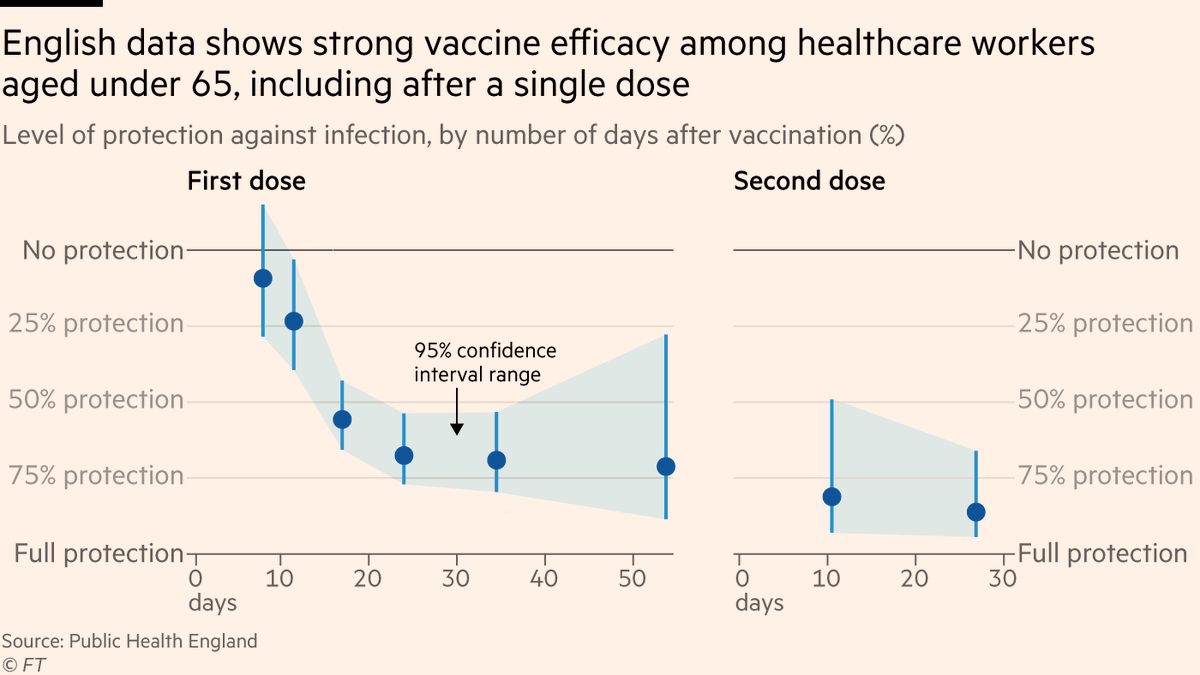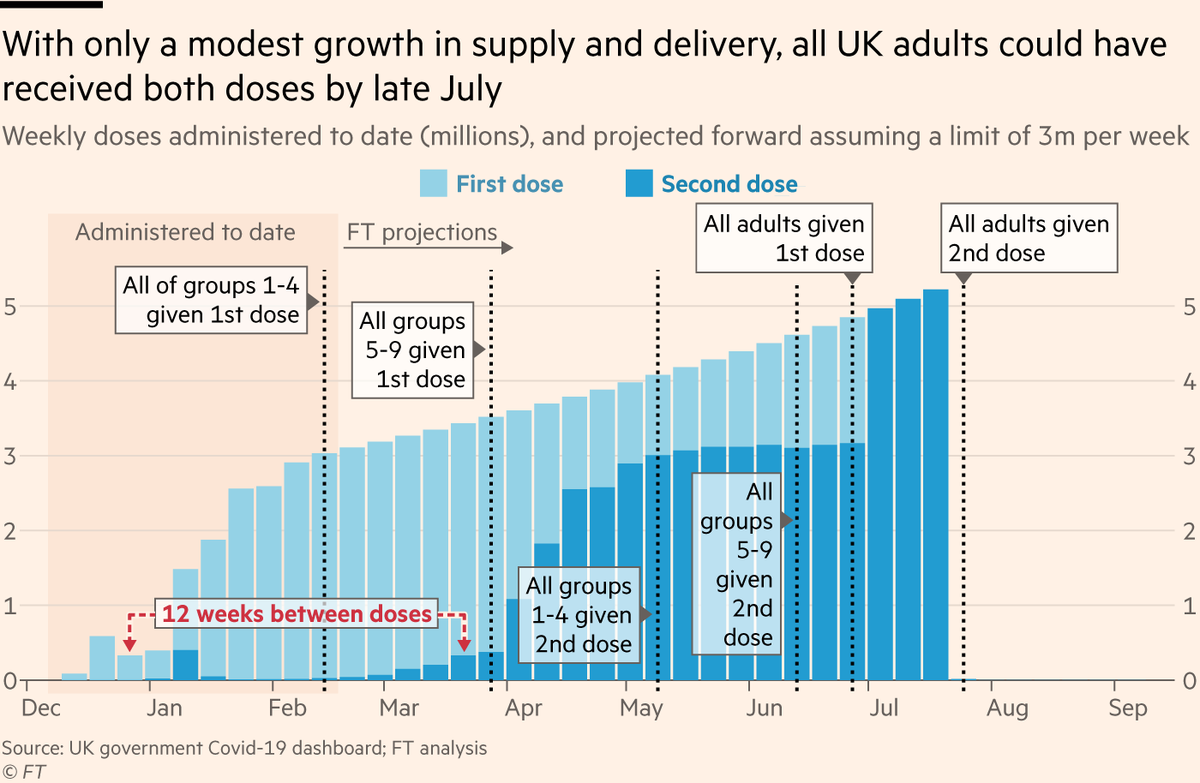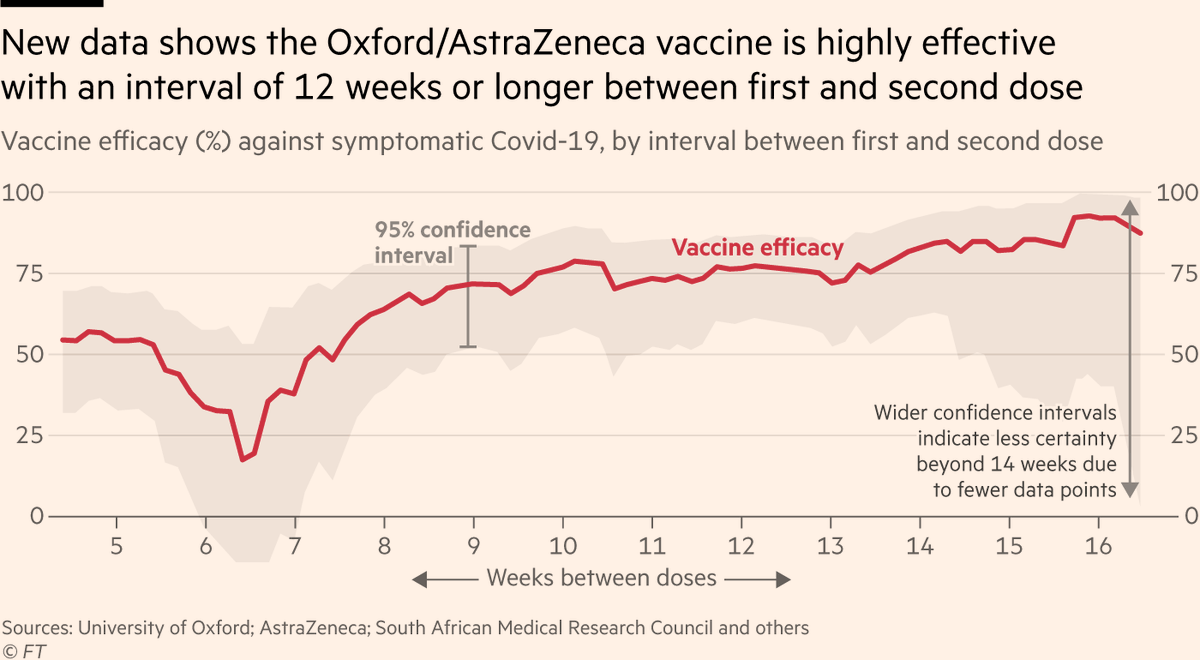
NEW: it’s a while since I’ve done a big international Covid thread, but this one feels important.
The first six weeks of 2021 have gone rather well in terms of humanity’s fight against Covid.
As well as the rollout of vaccines, global cases halved(!) between Jan 11 and Feb 18
The first six weeks of 2021 have gone rather well in terms of humanity’s fight against Covid.
As well as the rollout of vaccines, global cases halved(!) between Jan 11 and Feb 18

It’s worth looking beneath the surface at what has driven that steep decline, as it’s far from a one-size-fits all explanation.
In some countries — the UK being the most striking — restrictions have done a lot of the heavy lifting, and this is about adherence as much as policy.
In some countries — the UK being the most striking — restrictions have done a lot of the heavy lifting, and this is about adherence as much as policy.

But elsewhere — particularly India & South Africa — the scale of previous waves means levels of natural immunity are *much* higher than anything we’ve seen in UK or elsewhere in developed world.
In these areas, antibodies & T-cells will have done a lot more of the heavy lifting.
In these areas, antibodies & T-cells will have done a lot more of the heavy lifting.

Before anyone says "see, we should have stayed open", South Africa has among the highest excess mortality in the world, much higher than UK. India also suffered very high excess deaths.
If you’ve got lots of natural immunity, it can help you. But it doesn’t come cheap.
If you’ve got lots of natural immunity, it can help you. But it doesn’t come cheap.
The much-discussed comparison of California vs Florida is another good demonstration of the nuances of how a wave of infection is brought low
CA had restrictions, FL did not. FL also had higher levels of pre-existing immunity.
Infections fell in both, but faster & further in CA
CA had restrictions, FL did not. FL also had higher levels of pre-existing immunity.
Infections fell in both, but faster & further in CA

And now, a plot twist:
You’ll recall I said global cases had fallen steeply to Feb 18.
It’s now Feb 25, and cases are on the rise again, up 5% over the last 6 days.
This is a much faster rebound than what we saw last spring/summer, where the fall went further and lasted months
You’ll recall I said global cases had fallen steeply to Feb 18.
It’s now Feb 25, and cases are on the rise again, up 5% over the last 6 days.
This is a much faster rebound than what we saw last spring/summer, where the fall went further and lasted months

And a closer look at where cases are rising again and what’s happening in those countries shows the risk of assuming we’re all now on the home stretch. 

Tight restrictions and high levels of natural immunity can bring infections low and keep them there; half measures can’t.
Take France: after lockdown in November restrictions were relaxed, and have been much looser than UK since. Antibody prevalence also much lower. The results:
Take France: after lockdown in November restrictions were relaxed, and have been much looser than UK since. Antibody prevalence also much lower. The results:

Brazil is another cautionary tale. Minimal restrictions for months, and reports of herd immunity greatly exaggerated
⬇️
Thousands of excess deaths every week for a year as the epidemic smoulders on. Even in Manaus, once the symbol of herd immunity, resurgence sent deaths soaring
⬇️
Thousands of excess deaths every week for a year as the epidemic smoulders on. Even in Manaus, once the symbol of herd immunity, resurgence sent deaths soaring

(For more on Manaus, see @WesPegden’s debunking of one study that claimed antibody prevalence of 76% there
A fully randomised follow-up study found the peak was more like 15% thelancet.com/journals/langl…)
https://twitter.com/WesPegden/status/1336801382955933697
A fully randomised follow-up study found the peak was more like 15% thelancet.com/journals/langl…)
And to those who look at the ongoing resurgences in France and Eastern Europe and say, "yes but we have vaccines now, so we don’t care about cases anymore because they won’t make people seriously ill", I would say the following:
1) I suspect most people reading this tweet live in the UK or US, both of which are near the top of the vaccination leader-board. Most people live elsewhere.
UK has given at least one dose to 6x more of its population than France or Czech Republic, both experiencing resurgences.
UK has given at least one dose to 6x more of its population than France or Czech Republic, both experiencing resurgences.

2) Large parts of Europe are struggling to administer their vaccines to a wary public, in some cases having fanned the flames of vaccine hesitancy themselves.
France has more than half of its 7.7m vaccines sitting in cold storage ft.com/content/f009d2…
France has more than half of its 7.7m vaccines sitting in cold storage ft.com/content/f009d2…

3) And the resurgences we’re already seeing are not just in cases. Hospital admissions are rising again in much of Eastern Europe ft.com/content/823863… 

To conclude:
Every day brings more good vaccine news, but it’ll be months (in rich countries) or years (in poorer countries) before people have these vaccines in their arms.
Covid is not taking a break in the meantime.
Our story, with @AnnaSophieGross ft.com/content/f671f0…
Every day brings more good vaccine news, but it’ll be months (in rich countries) or years (in poorer countries) before people have these vaccines in their arms.
Covid is not taking a break in the meantime.
Our story, with @AnnaSophieGross ft.com/content/f671f0…
As we continue to track positive news about vaccine development and watch protective effects show up in UK & US as they have in Israel, we must not forget about the millions in Eastern Europe, Central Asia and Latin America who continue to face a deadly virus largely unprotected.
Finally a footnote:
Antibody prevalence doesn’t capture other indicators of immunity e.g T-cells. This means % of people with some immunity will be higher than antibody prevalence, but it doesn’t change the fact that natural immunity levels are far higher in SA & IND than UK etc
Antibody prevalence doesn’t capture other indicators of immunity e.g T-cells. This means % of people with some immunity will be higher than antibody prevalence, but it doesn’t change the fact that natural immunity levels are far higher in SA & IND than UK etc
• • •
Missing some Tweet in this thread? You can try to
force a refresh

















